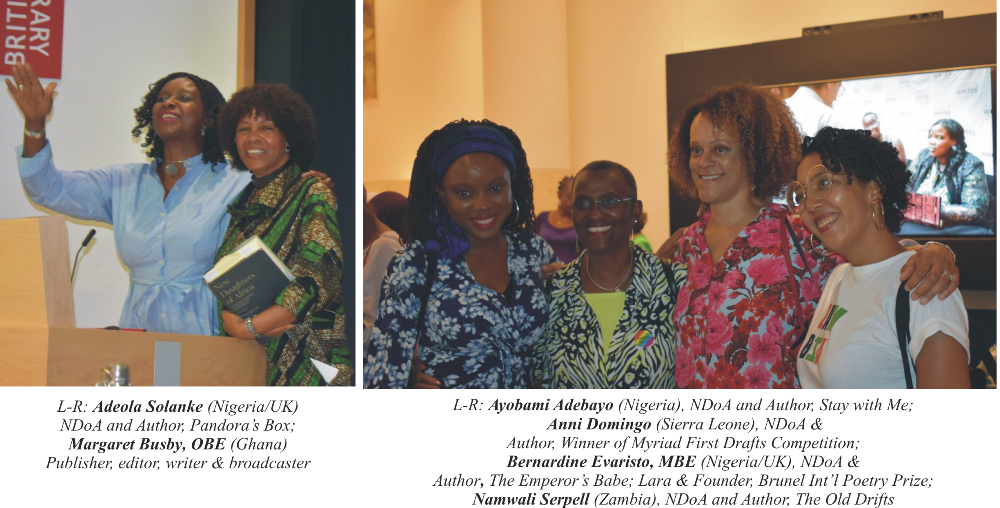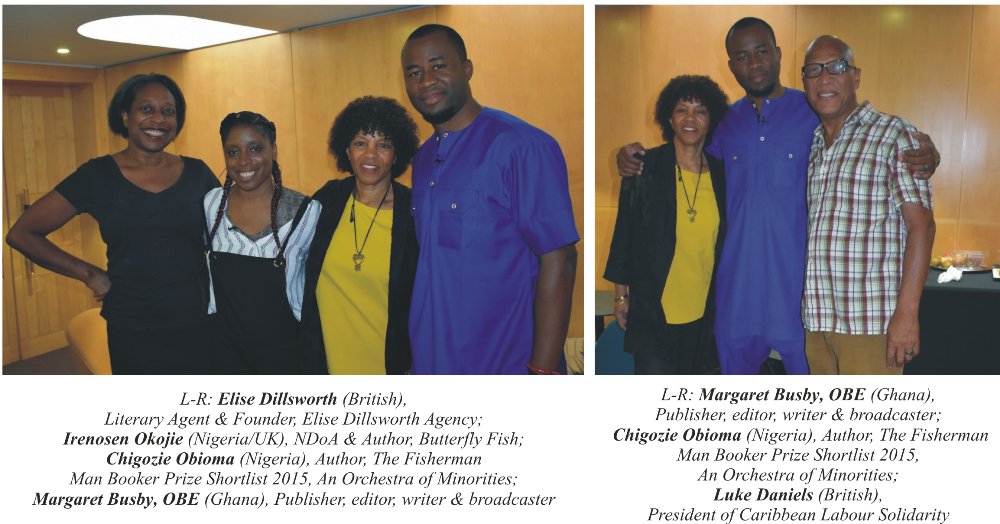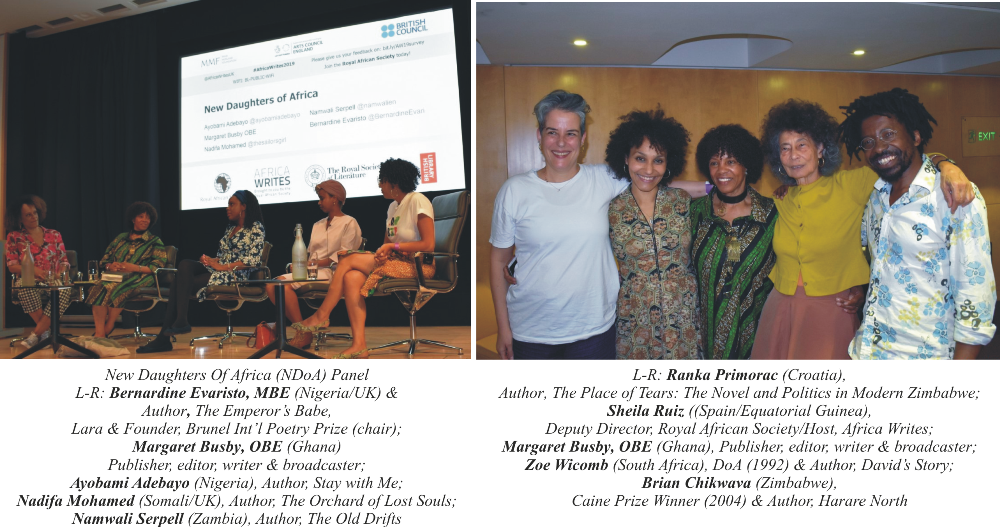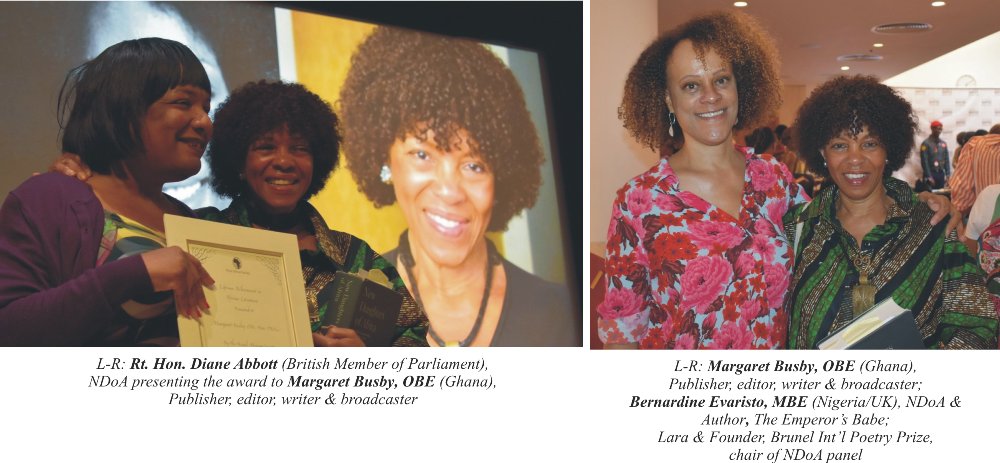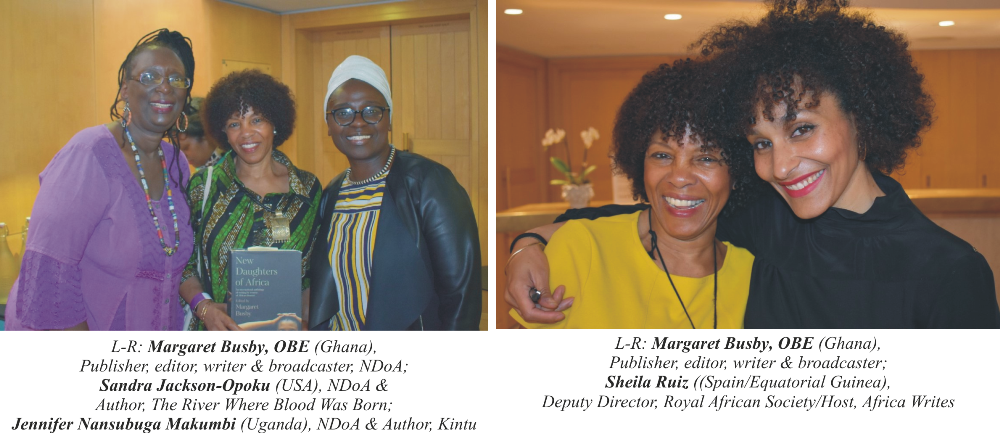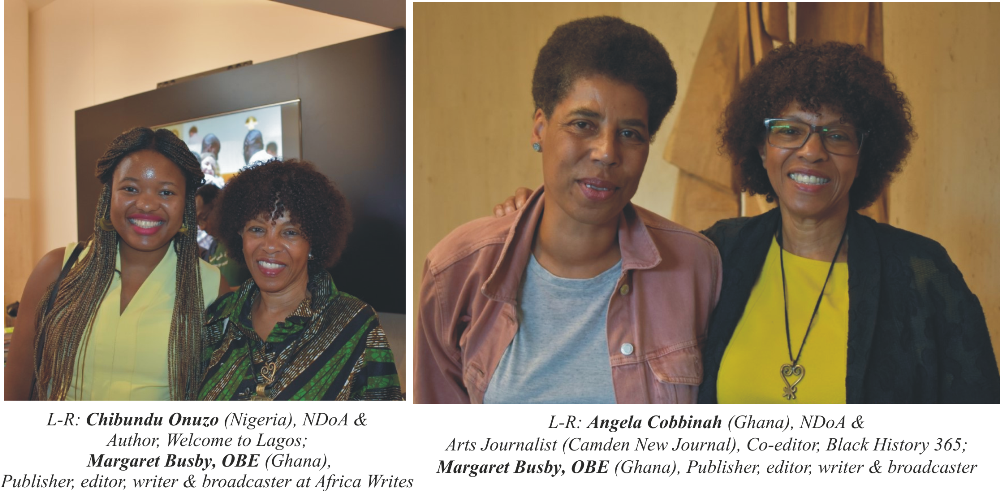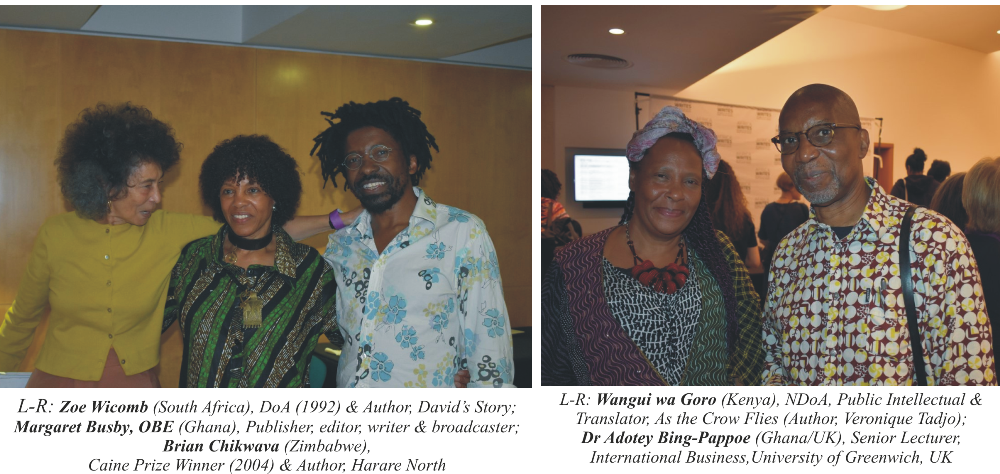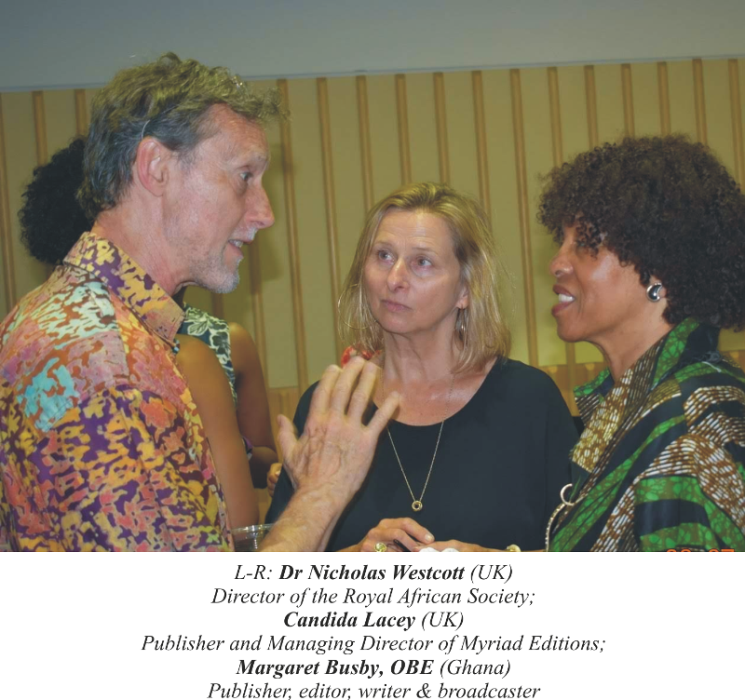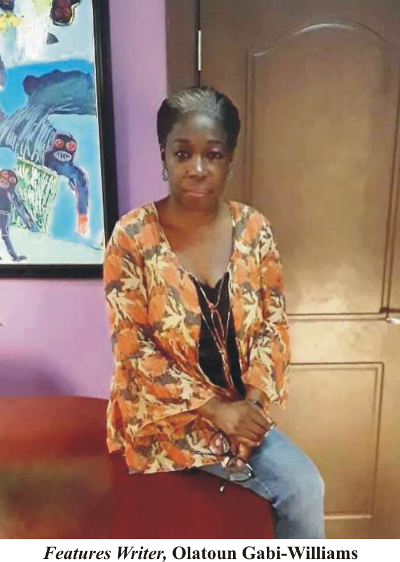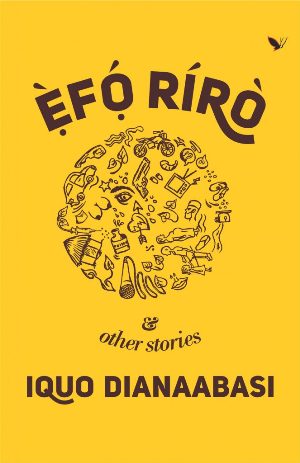

CALL THEM FEMINIST PRESS
Celebrating African Women in Literature

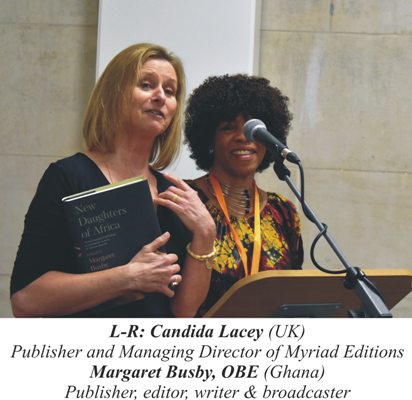
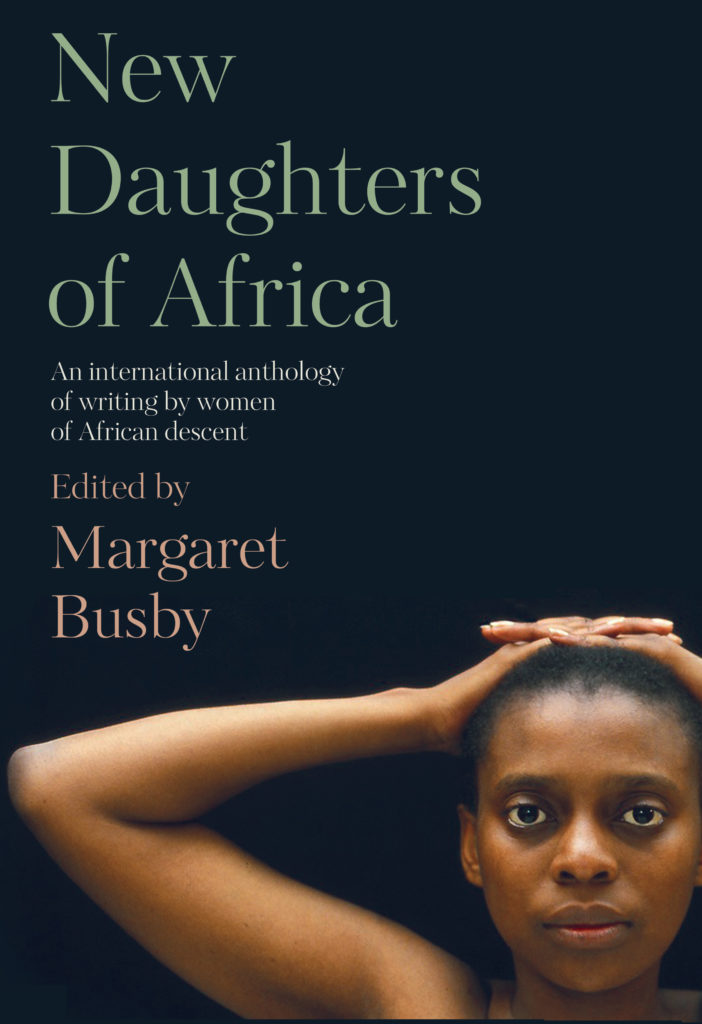

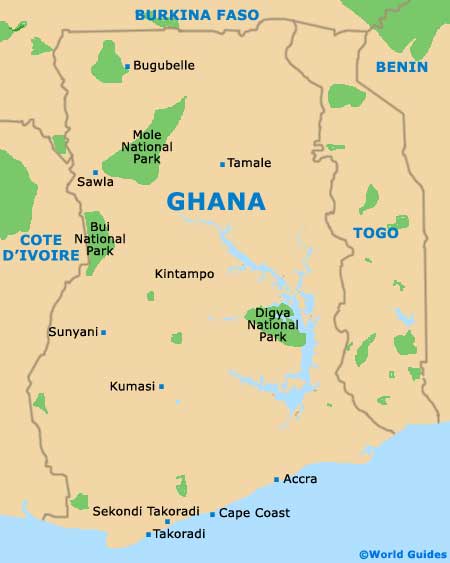 My
first meeting with Margaret Busby (Nana
My
first meeting with Margaret Busby (Nana 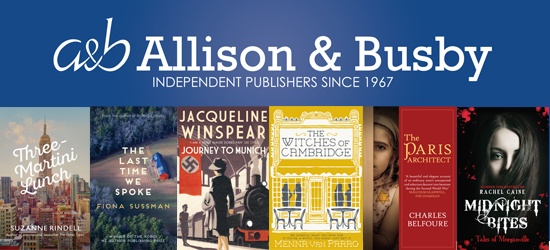 Akua Ackon), seems a long time ago now.
A reading event held at Terra Kulture, the Nigerian Cultural Centre to promote the Etisalat Prize for Literature, then in its second edition,
but recently dormant (though an immensely popular and useful prize). Busby was
an active patron. Born in Ghana to parents with Caribbean links, she achieved
renown in 1967, when with Clive Allison, she co-founded Allison & Busby
whose author list featured such notables as Nuruddin Farah (Somalia), Ishmael
Reed (USA), Carlos Moore (Cuba) and Buchi Emecheta (Nigeria). She was the
youngest and first black female publisher in the United Kingdom. She left
Allison & Busby in 1987 and achieved renowned as a broadcaster (radio &
TV); as a playwright (radio & stage) and as the woman who gave us Daughters of Africa (1992), the magnum opus and seminal anthology that provided a platform for ‘Words and Writings by Women of African Descent from the Ancient Egyptian to the Present’.
Akua Ackon), seems a long time ago now.
A reading event held at Terra Kulture, the Nigerian Cultural Centre to promote the Etisalat Prize for Literature, then in its second edition,
but recently dormant (though an immensely popular and useful prize). Busby was
an active patron. Born in Ghana to parents with Caribbean links, she achieved
renown in 1967, when with Clive Allison, she co-founded Allison & Busby
whose author list featured such notables as Nuruddin Farah (Somalia), Ishmael
Reed (USA), Carlos Moore (Cuba) and Buchi Emecheta (Nigeria). She was the
youngest and first black female publisher in the United Kingdom. She left
Allison & Busby in 1987 and achieved renowned as a broadcaster (radio &
TV); as a playwright (radio & stage) and as the woman who gave us Daughters of Africa (1992), the magnum opus and seminal anthology that provided a platform for ‘Words and Writings by Women of African Descent from the Ancient Egyptian to the Present’.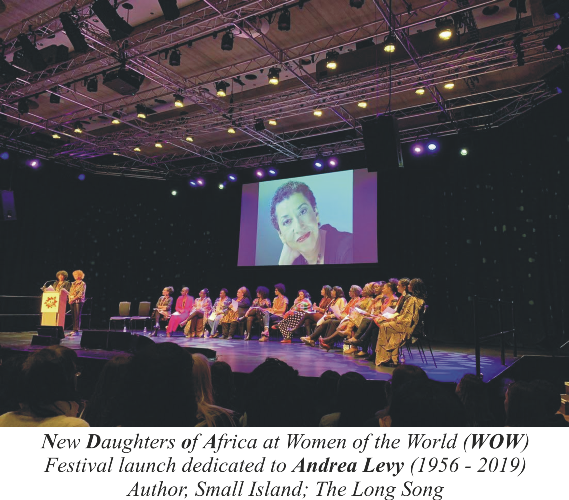
We owe Margaret Busby an immense debt of gratitude for this 1992 work. Its chronological arrangement - by date of birth - enables us, to quote her, ‘to try to chart the development of a literary canon over the years, to restore links and show the continuity of expression that against all odds still exists in much of the material’. At an earlier point in the Introduction,she emphasises that however vast, the collection is not a ‘definitive work,implying that everything excluded merits lesser consideration. I prefer to see it as a contribution to the cause of reclaiming for women of African descent a place in literary history. If its effect is to spur others on to do better, it will have achieved its purpose.’
This year, on 8 March 2019 International Woman’s Day, her much-anticipated New Daughters of Africa: An International Anthology of Writing by Women of African Descent was released by Myriad Editions (UK). On 7 March, the eve of Women’s Day, Myriad and editor, Margaret Busby, threw a party attended by a good many of the 200 contributors from Africa and her Diasporas, thirty-six of whom are mentioned in this tiny Nigeria dominated sample. It also features their pre-NDoA credentials for entry into the pantheon of writers. They are arranged in the volume (not in this sample) according to decade of birth primarily, writes Busby, ‘to give context to the generational links’ and to continue to chart the black feminist literary canon:
- · Andrea Levy (UK/Jamaica) (Small Island, The Long Song) – Headline Review, UK
- · Olumide Popoola (Nigeria) (When We Speak of Nothing) – Cassava Republic Press, Nigeria
- · Chimamanda Ngozi Adichie (Nigeria) (Americanah, We Should All Be Feminists) – Farafina, Nigeria
- · Zadie Smith (UK/Jamaica), (White Teeth; On Beauty) - Penguin Random House, UK
- · Edwidge Danticat (Haiti) (Breath, Eyes, Memory) - Penguin Random House, UK
- · Yewande Omotoso (Nigeria/South Africa) (The Woman Next Door) – Farafina, Nigeria
- · Hilda Twongyeirwe (Uganda) Co-Editor, (Nothing to See Here; Beyond the Dance) - Femrite Publications
- · Kit de Waal (British/Irish) (My Name is Leon) - Penguin Random House, UK
- · Goretti Kyomuhendo (Uganda) (The First Daughter) - Fountain Publishers
- · Donu Kogbara (Nigeria) (All Africa Journalist)
- · Bernardine Evaristo MBE (UK/Nigeria) (The Emperor’s Babe) - Penguin Random House, UK
- · Zukiswa Wanner (South Africa) (The Madams: A Widely Provocative Title) - Oshun
- · Ellah Wakatama Allfrey (Zimbabwe/UK) editor, (Safe House) - Cassava Republic Press, Nigeria
- ·
Yvonne Adhiambo Owuor (Kenya) (Dust) - Kwani?
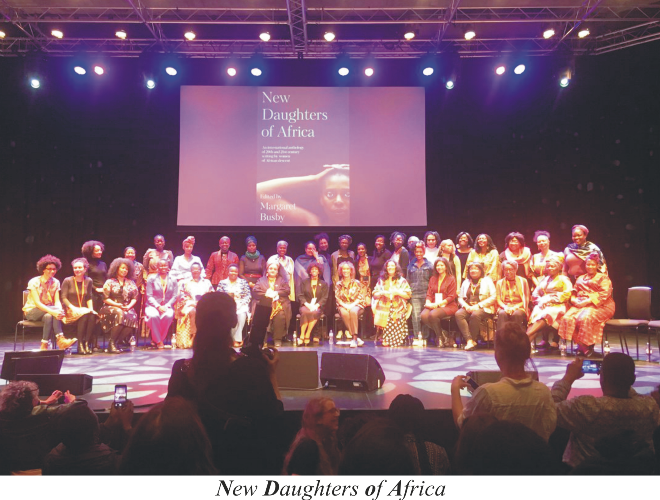
- · Chika Unigwe (Nigeria/Belgium) (Night Dancer) – Parrésia Publishers Ltd
- · Ayobami Adebayo (Nigeria) (Stay with Me) - Ouida Books
- · Juliane Okot Bitek (Uganda) (100 Days) - University of Alberta Press
- · Wanjiku Wa Ngugi (Kenya) (The Fall of Saints) - Simon & Schuster
- · Hawa Jande Golakai (Liberia) (The Lazarus Effect) - Cassava Republic Press
- · Yaba Badoe (Ghana/UK) (Jigsaw of Fire & Stars) - Zephyr
- · Taiye Selasi (Ghana/Nigeria/USA) (Ghana Must Go) – Penguin Group
- · Lola Shoneyin (Nigeria) (The Secret Lives of Baba Segi’s Wives) - Cassava Republic Press, Nigeria
- · Nnedi Okorafor (Nigeria/USA) (Sunny and the Mysteries of Osisi; What Sunny Saw in the Flames) - Cassava Republic Press, Nigeria
- · Sade Adeniran (Nigeria/UK) (Imagine This) - Cassava Republic Press, Nigeria
- · Sarah Ladipo Manyika (Nigeria/UK) (Like A Mule Bringing Ice Cream to the Sun) - Cassava Republic Press, Nigeria
- · Noo Saro-Wiwa (Nigeria/UK) (Looking For Transwonderland: Travels in Nigeria) - Soft Skull Press, UK
- · Leila Aboulela (Sudan/Egypt/Scotland) (Elsewhere, Home) - Telegram Books, UK
- · Chibundu Onuzo (Nigeria) (Welcome to Lagos) – Faber & Faber
- · Sefi Atta (Nigeria) (News from Home) - Interlink Books
- · Minna Salami (Nigeria/Finland) (Ms. Afropolitan blog; Sensuous Knowledge: A Radical Black Feminist Approach for Everyone) - HarperCollins, US & Zed Books, UK (forthcoming 2019)
- · Yemisi Aribisala (Longthroat Memoirs: Soups, Sex and Nigerian Taste Buds) - Cassava Republic Press, Nigeria
- · Reni Eddo-Lodge (Nigeria/UK) (Why I Am No Longer Talking To White People About Race) – Bloomsbury
- · Beatrice Lamwaka (Uganda) (Butterfly Dreams & Other Stories) - Critical, Cultural and Communications Press
- · Maaza Mengiste (Ethiopia/USA) (Beneath the Lion’s Gaze) – Norton
- · Nana Oforiatta-Ayim (Ghana) (Founder, ANO Institute of Arts and Knowledge) (The God Child) – Bloomsbury (forthcoming 2020)
- · Diana Evans (Nigeria/UK) (26a) – Chatto & Windus
- · Adeola Solanke (Nigeria/UK) (Pandora’s Box) – Oberon Books
- · Kadija Sesay (Sierra Leone/UK) (Founder, Sable Lit Mag and Sable Litfest) (Irki) – Peepal Tree Press
- · Aminatta Forna (Sierra Leone/Scotland) (The Memory of Love) – Bloomsbury
- · Patience Agbabi (Nigeria/UK) (Telling Tales) - Canongate Books
- · Tess Onwueme (Nigeria) (The Reign of Wazobia) - Heinemann Educational Books
- · Wangui wa Goro (Kenya) Translator, As the Crow Flies(Author, Veronique Tadjo) - Heinemann Books
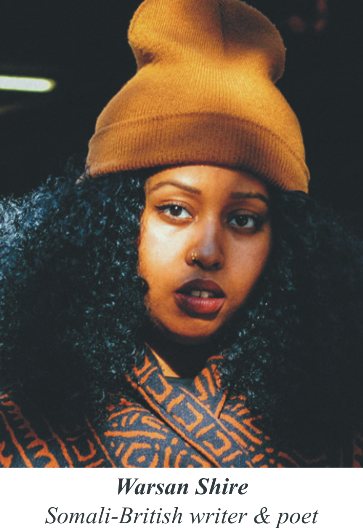
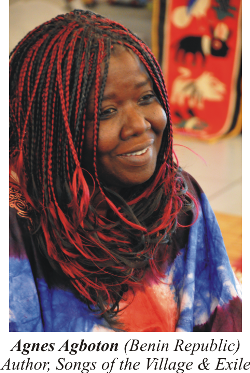
Warsan Shire cannot be excluded from my sample. She is the Somali-British writer whose poems about the female body, failed romance, sexual imposition, sex workers, migrants, are shot through by a searing, palpable sense of loss, dislocation and disorientation. In her poem ‘Home’, Shire speaks of the violence and anguish of the condition of refugees fleeing war in images that will leave you gasping. Her career was launched in 2013 when she won the inaugural Brunel African Poetry Prize. Three years later, she catapulted to international fame with her collaboration with Beyoncé. Lemonade, the R & B singer’s Grammy Award-winning album, features lyrics by Warsan Shire, who is one of ten poets selected for Complete Works II, a national development programme promoting diversity and quality in British poetry.
Occupying positions of
pride on my list are Spanish-language writers
Agnes Agboton (Republic of Benin) and Trifonia Melibea Obono (Equatorial
Guinea). Agboton is long established. Translated pre-NDoA by the gifted
American Lawrence Schimel, three poems from her collection, Songs of the
Village and Exile, originally written in her native Gun, sit in this
anthology alongside ‘Let the Nkúkúmá Speak’, a translated short
story by Trifonia Melibea Obono. She is author of La Bastarda, which
was published in 2018 by Feminist Press (USA) in its original Spanish. In the same
year, South Africa’s Modjaji Books published the novel in English. Lawrence
Schimel served as translator for both Obono’s NDoA short story and her
novel, which is the first book by a woman from Equatorial Guinea to be
translated into English. About lesbian rebellion in Fang society, unsurprisingly
La Bastarda has been banned in Obono’s home country. Banned books
have power: in 2018 Trifonia Melibea Obono won the Global Literature in
Libraries Initiatives (GLLI) Translated YA Book Prize. 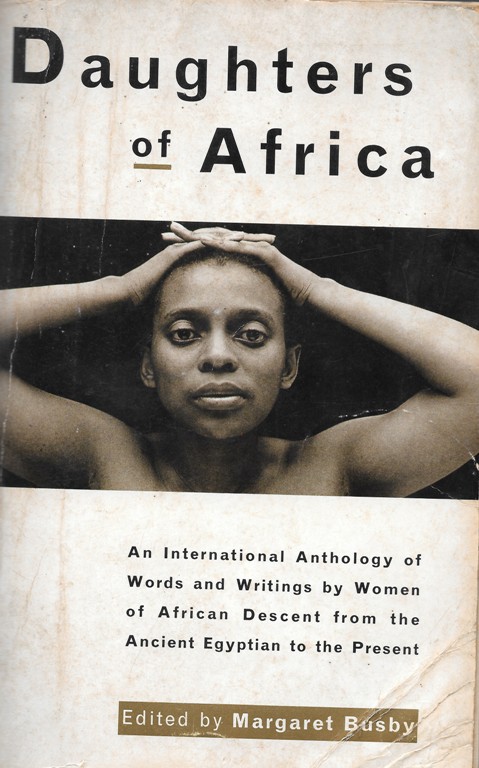
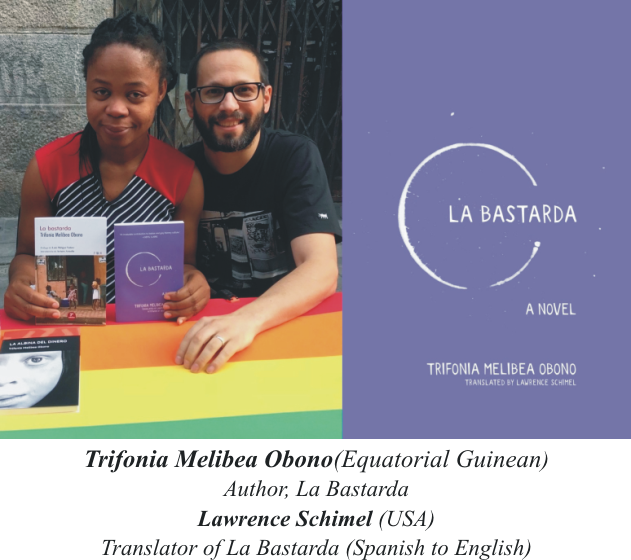 A major achievement of
Daughters of Africa is its power
as an advocacy tool for indigenous-language orature. Busby’s
introduction contains a memorable
quote from June Jordan, an American contributor to the original volume: ‘If
we lose our fluency in our language, we may irreversibly forsake elements of
the spirit that have provided for our survival’. Using translations of
indigenous-language poems to kick off the anthology, is Busby’s means of
demonstrating that the creative output of African women has ‘roots that
extend beyond written records’. In New Daughters of Africa translated
works underscore the case for dismantling, through the translations of texts,
barriers erected by Africa’s breathtakingly diverse ethnicities and those
barriers created by colonial imposition of European languages. An impressive
consensus has emerged across the continent and its Diasporas that we need to
speak and listen far more to one another through our writings. Sharing stories
across our borders, comparing our experiences in the world as African women -
and men - will help us know one another. In an article published in The Guardian
UK on 9 March 2019, a day after the launch, Margaret Busby quotes
translator Renée Edwige Dro, director of Danbé at L’Harmattan, Ivory Coast, and
contributor to the book. “It was as if the daughters of Africa
featured in that
(original) anthology were telling me, their daughter and grand-daughter, to
bravely go forth and bridge the literary gap between francophone and anglophone
Africa.â€
A major achievement of
Daughters of Africa is its power
as an advocacy tool for indigenous-language orature. Busby’s
introduction contains a memorable
quote from June Jordan, an American contributor to the original volume: ‘If
we lose our fluency in our language, we may irreversibly forsake elements of
the spirit that have provided for our survival’. Using translations of
indigenous-language poems to kick off the anthology, is Busby’s means of
demonstrating that the creative output of African women has ‘roots that
extend beyond written records’. In New Daughters of Africa translated
works underscore the case for dismantling, through the translations of texts,
barriers erected by Africa’s breathtakingly diverse ethnicities and those
barriers created by colonial imposition of European languages. An impressive
consensus has emerged across the continent and its Diasporas that we need to
speak and listen far more to one another through our writings. Sharing stories
across our borders, comparing our experiences in the world as African women -
and men - will help us know one another. In an article published in The Guardian
UK on 9 March 2019, a day after the launch, Margaret Busby quotes
translator Renée Edwige Dro, director of Danbé at L’Harmattan, Ivory Coast, and
contributor to the book. “It was as if the daughters of Africa
featured in that
(original) anthology were telling me, their daughter and grand-daughter, to
bravely go forth and bridge the literary gap between francophone and anglophone
Africa.â€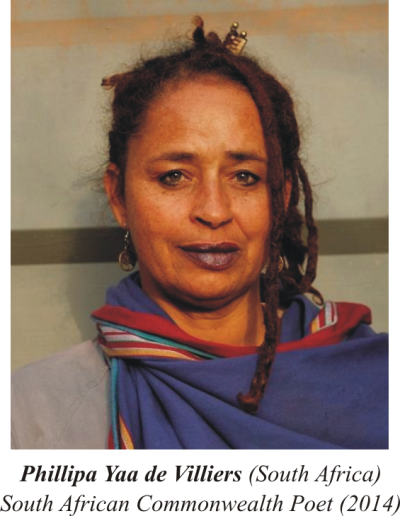
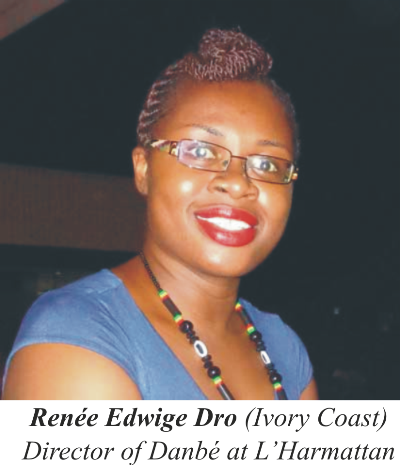 Busby also quotes Phillipa Yaa de Villiers,
South African Commonwealth Poet (2014), whose response to the original Daughters
of Africa, is particularly moving:
Busby also quotes Phillipa Yaa de Villiers,
South African Commonwealth Poet (2014), whose response to the original Daughters
of Africa, is particularly moving:
“We were behind the bars of Apartheid – we South Africans had been cut off from the beauty and majesty of African thought traditions, and Daughters of Africa was among those works that replenished our starved minds, connecting us to the Black planet of memory and imagination, correcting the imbalance of information and awakening our own potential in ourselves...(the anthology) brings our separate spaces on the planet into each other’s purview, our experiences accented by our geographical and historical conditions, a text that creates solidarity, appreciation and reminds us that we are never aloneâ€
And these social and intergenerational considerations can yield economic good: badly needed revenue from books translated and traded not only to the Global North and within it, but translated and traded here across our vast geographies: our Anglophone, francophone, hispanophone, lusophone, Italian, German, Dutch and indigenous language-speaking communities.


In May 2017, Myriad Editions merged with New Internationalist, a long-established Oxford (UK) based co-operative and publisher of the anthology of The Caine Prize for African Writing. The merger is a testament to Myriad’s subscription to the campaign for increased visibility for African writing in the world’s biblio-diversity. In 2018, the Myriad First Drafts Competition focused on women of African descent. The two winners, Anni Domingo and Rutendo Chabikwa, have contributed writings to New Daughters of Africa. Publishing Director Candida Lacey is an English woman. Her collaboration on the first DoA while working for Jonathan Cape and the publication of NDoA by Myriad Editions, which she leads, are a statement of her support for increasing diversity in the publishing industry, something Busby has championed, notably as founding member in the 1980s of Greater Access to Publishing (GAP), which sought to increase black representation in British publishing. And today, she is still advocating the cause.
In the Acknowledgments section of NDoA, Busby tells us that she met Candida Lacey in 1989. She was working at that time at the feminist publishers, Pandora Press, which had just brought out An Anthology of British Women Writers. She and Lacey ‘...talked of the need to rectify the absence of black women from the literary canon...’
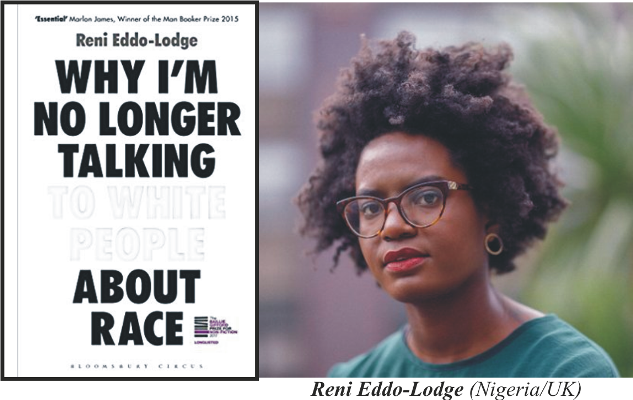
Jonathan Cape in 1992. Myriad Editions in 2019.Candida Lacey is not fighting for us; it is the feminist press that is standing with us. Why this matters is summed up in the 2017 Bloomsbury publication Why I’m No Longer Talking to White People About Race, Reni Eddo-Lodge’s fierce, moving polemic. The chapter entitled The Feminism Question is the challenge she has thrown to her readers. They include white people who dare to brave her text. The chapter demonstrates why the inclusion of black women is imperative in the fight to protect women’s rights to participate in relevant spaces. Responding to the controversy generated by an all-white all-women TV show in 1990s Britain, this is the statement Reni Eddo-Lodge has made: ‘When feminists can see the problem with all-male panels, but can’t see the problem with all-white television programmes, it’s worth questioning who they are really fighting for.’

Once again my cyber world is under siege and I am celebrating. Conversations between Daughters of Africa and their networks of friends; photographs from the launch events; links to traditional media publications around the release of NDoA have been pouring into my inbox and my news feeds:
- Financial Times: https://www.ft.com/content/2a4e64a8-508a-11e9-8f44-fe4a86c48b33
- The Voice: https://www.voice-online.co.uk/article/new-daughters-africa-amplifying-black-womens-voices
- The Guardian article by Margaret Busby: https://www.theguardian.com/books/2019/mar/09/from-ayobami-adebayo-to-zadie-smith-meet-the-new-daughters-of-africa
- The Guardian podcast with Margaret Busby: https://www.theguardian.com/books/audio/2019/mar/26/why-is-it-so-hard-for-white-people-to-talk-about-racism-books-podcast
- Camden New Journal: http://camdennewjournal.com/article/africas-new-daughters-celebrated-in-a-new-anthology
- Brittle Paper: https://brittlepaper.com/2019/03/photos-from-the-london-launch-of-margaret-busbys-new-daughters-of-africa-anthology/
- BBC Woman's Hour: https://www.bbc.co.uk/programmes/m00035n8
- Trinidad Express: https://www.trinidadexpress.com/opinion/columnists/new-daughters-of-africa/article_10a3aa64-58c7-11e9-9bf7-5f94f19868ce.html
Irish Times journalist Sally Hayden recognizes New Daughters of Africa as broaching the neglected 'feminist lineage' that is a fact of African history. She quotes Chimamanda Ngozi Adichie speaking about her great-grandmother, ‘who she is sure was a feminist, whether or not she used that word for it. ’Hayden quotes Minna Salami: ‘When someone says that feminism isn’t African, we are reminded that we do not have the historical proof to show how continuous our presence is on the continent.’
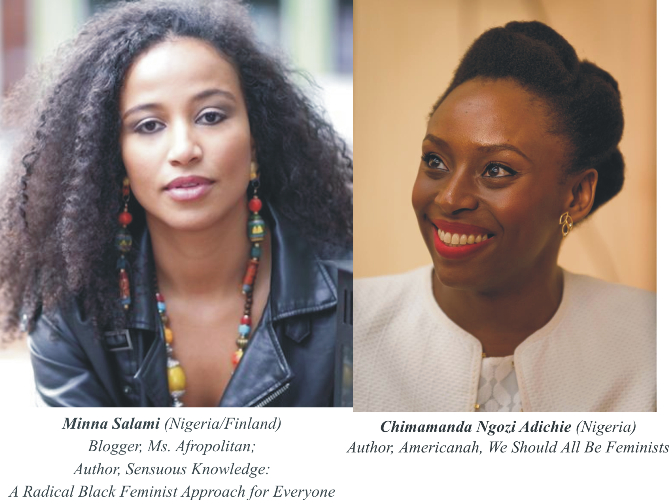
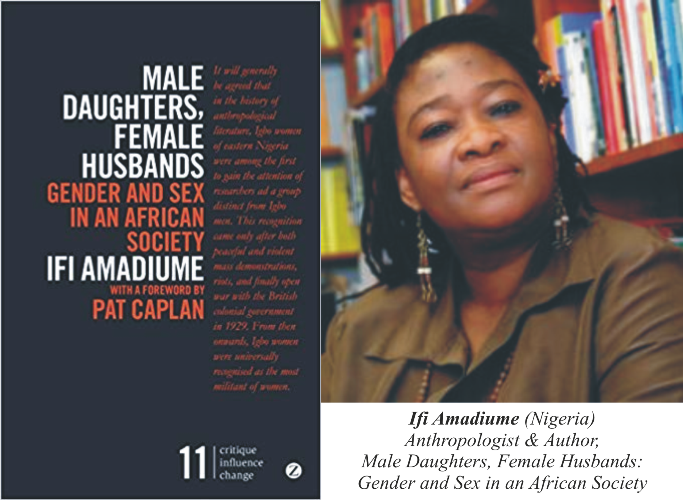

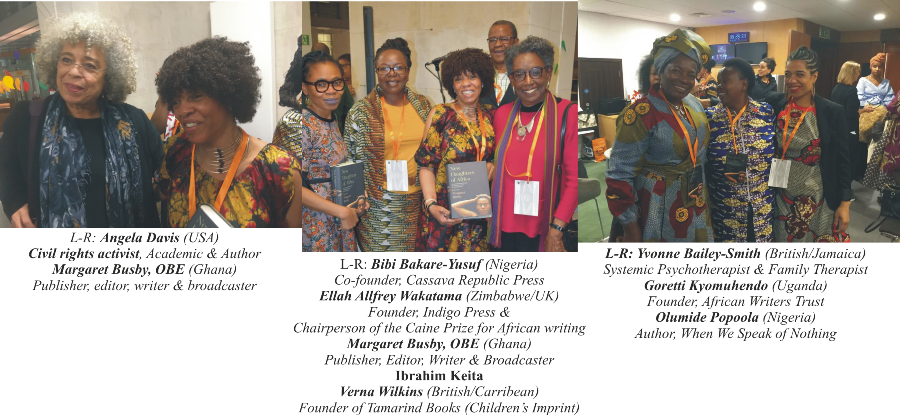
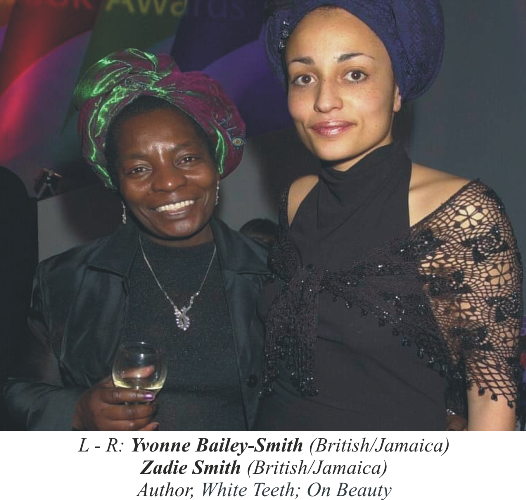
The first Daughters of Africa is dedicated to Margaret Busby’s mother. New Daughters of Africa as a follow-up testifies to the importance she has placed not only on tracking a canon of black feminist writing but additionally, mapping the canon through intergenerational connections. That Angela Davis should participate in the Women’s Day 2019 events launching the New Daughters of Africa; that Gladys Casely-Hayford alongside her mother, Adelaide Casely-Hayford, should feature in the original Daughters of Africa; that Zadie Smith and her mother, Yvonne Bailey- Smith, should both feature as New Daughters of Africa; that Rebecca Walker should be a contributor to the follow-up of the first Daughters of Africa through which her mother, Alice Walker, speaks to her - these facts look like stardust sprinkled across a magnificent project built of so many stories: personal stories permeated by ‘an awareness of the wider world, and of the impact of national and international politics’; stories driven by history ‘rememoried’; stories addressing migration, ‘specifically ‘Windrush stories’ typified by the writing of Andrea Levy ... an inescapable reference point in the British-Caribbean nexus...Stories of mothers separated from offspring, and the resultant psychological effects...’
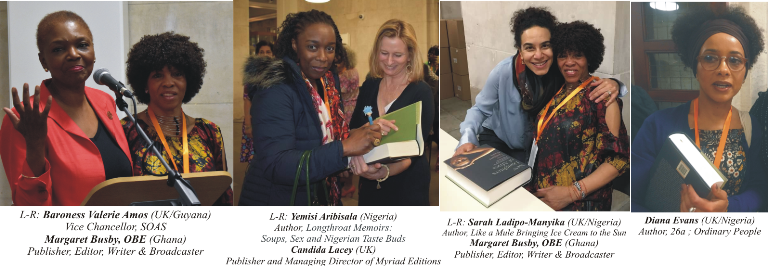
The entire DoA project is a towering achievement but the roll-call of stand-out names in its first edition is spectacular in its reach. Creative writers, scholars, activists, abolitionists, monarchs: women who have helped, with varying degrees of renown, to shape human history: Hatshepsut (Ancient Egypt 1501 – 1447); Makeda, Queen of Sheba (Ethiopia); Harriet Tubman (USA); Sojourner Truth (USA); Bessie Head (South Africa/Botswana); Ama Ata Aidoo (Ghana); Maryse Condé (Guadeloupe); Buchi Emecheta (Nigeria); Mabel Segun (Nigeria); Nella Larsen (USA); Zora Neale Hurston (USA); Efua Sutherland (Ghana); Toni Morrison (USA); Flora Nwapa (Nigeria); Zulu Sofola (Nigeria); Jamaica Kincaid (Antigua); Ntozake Shange (USA); Mary Seacole (Jamaica/UK); Phyllis Wheatley (Senegal/USA); Audre Lorde (USA); Molara Ogundipe-Leslie (Nigeria); Tsitsi Dangarembga (Zimbabwe). In my sample from Busby’s pantheon, women sharing experience through the pages of the first anthology with Africa’s new daughters, I have already mentioned American civil rights icon Angela Davis and The Colour Purple author Alice Walker.
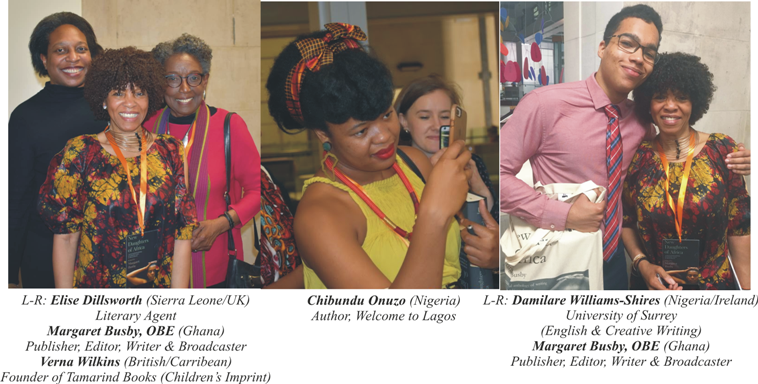

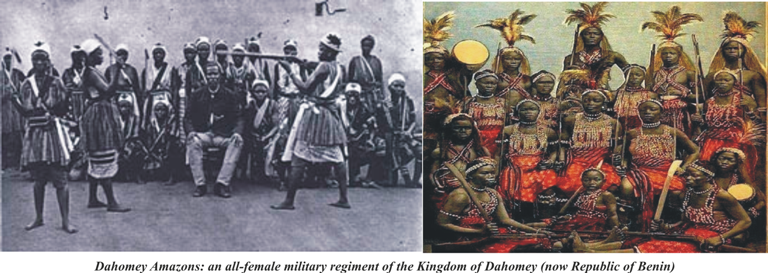
In her Guardian UK article of 9 March 2019, Busby points out that the anthology starts: ‘... with some important entries from the 18th and 19th centuries – a reminder that later generations stand tall because of those who have gone before. Nana Asma’u (1793–1863), a revered figure in northern Nigeria, spoke four languages and was an educated and independent Islamic woman whose life and work can be considered a precursor to modern feminism in Africa. Sarah Parker Remond (1815–1894),abolitionist, lecturer, suffragist, demonstrates many of the themes and serendipitous connections that characterise this anthology... Elizabeth Keckley (1818–1907), her life bridging the 19th and the 20th centuries, describes first-hand the trauma of enslavement in her autobiography, Behind the Scenes: Or, Thirty Years a Slave and Four Years in the White House, published in 1868 – exactly 100 years before the “mould-breaking year†that (writer) Delia Jarrett-Macauley refers to, when “on university campuses from Paris to New York, students were protesting against the old order, against bureaucratic elites, against capitalism, sexism and racism and all forms of authoritarianismâ€.’
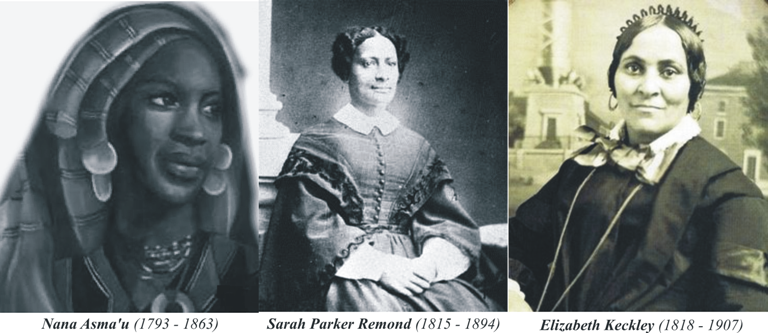
Ifi Amadiume’s contribution in the original DoA from Afrikan Matriarchal Foundations, contains an interesting sub-section entitled ‘Patriarchy Versus Matriarchy’. Here she describes the activities of the Aho Cult of the Nnobi community of South East Nigeria and contends that its activities symbolise a gender based struggle for power: ‘the incursion of a patriarchal people on an indigenous matriarchal society’.

AFTERWORD
On Saturday 6th July, at Africa Writes 2019, Margaret Busby was awarded the inaugural Africa Writes Lifetime Achievement Award in Africa Literature. [Africa Writes is the annual literature festival hosted by the Royal African Society and held at the British Library in Euston, London].
The award was presented to Margaret Busby by Rt. Hon. Diane Abbott, MP & New Daughter of Africa, after an introduction of the award by Adeola Solanke FRSA. The author/playwright of Pandora’s Box delivered this tribute to Dr. Busby:
“Thank you Africa Writes, the RAS, and the British Library, for inviting me to be part of the launch of a new and exciting tradition at Africa Writes.
It’s a terrific honour and a privilege to be here at this, the eighth Africa Writes festival, to announce the first Africa Writes Lifetime Achievement in African Literature award.
The Lifetime Achievement in African Literature will honour and pay tribute to those who have made a major contribution to African literature. Founded in 2019, it will be awarded at irregular intervals to writers, academics, publishers and translators, with careers spanning 30 years or more, in recognition of their life-long achievement within the field of African literature.
The award comes about because of the first recipient actually. About a month ago, I made a chance remark to Sheila Ruiz, about just how wonderful a certain person is, and she said “yes! We should celebrate that!!â€
And that certain person has kindly joined me, as Diane Abbott has, to pay tribute to writers We’ve sadly lost in recent years: Buchi Emetcheta and Andrea Levy. And at those tributes we say to each other, “why did we wait till they were no longer with us to thank them?â€
This, the 2019 inaugural award, honours a doyenne of the literary world, and the world of African arts and letters in particular who, fortunately, WILL be with us for many years more. I’m thrilled to announce that the 2019 The Royal African Society Africa Writes Lifetime Achievement Award goes to Margaret Busby OBE, Hon. FRSL (also titled Nana Akua Ackon).
Margaret, a major cultural figure in Britain and around the world, has a career which actually spans, not thirty, but fifty years – and, as we’ve seen with the impact of the new DOA, is still going strong. She is a trailblazing publisher, writer, playwright, editor, broadcaster, literary critic, and overall staunch advocate for diversity in the arts.
Her wikipedia page lists most of her incredible accomplishments, and I must add that wiki itself hosts many pages she’s unilaterally created herself for others - including mine! So you can read the full extent of her magnificent work there.
In closing, I’ll quote from a comment by one of her admirers, Jak Beula, founder of Nubian Jak.
“Dr Margaret is a living legend who has planted seeds in the most amazing and unexpected places. Her tireless dedication has not yet been fully appreciated due to her humility. But her like we have not seen in Britain before, and will not again for many a generation. Had she been from the US she would be world famous. It’s up to us to honour her during her lifetime.â€
I’d now like to
call on the Right
Honourable Diane Abbott MP, Shadow Home Secretary, to help us do just
that and to present the award.â€
